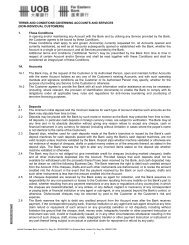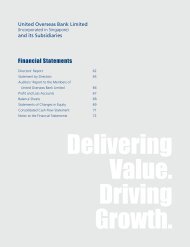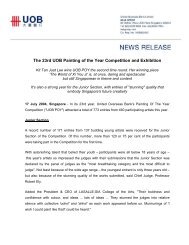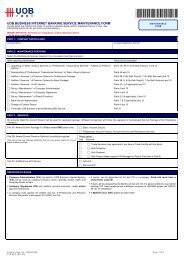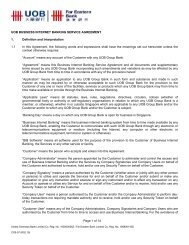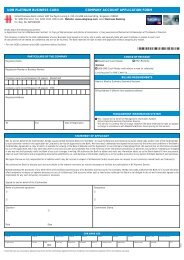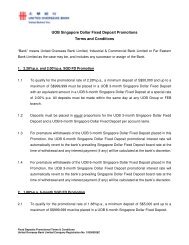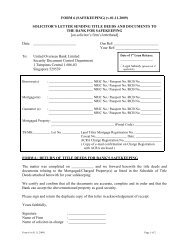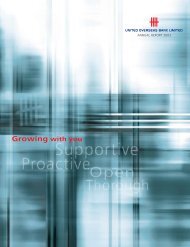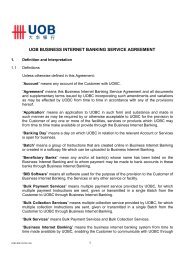UOB Annual Report 2002 - United Overseas Bank
UOB Annual Report 2002 - United Overseas Bank
UOB Annual Report 2002 - United Overseas Bank
Create successful ePaper yourself
Turn your PDF publications into a flip-book with our unique Google optimized e-Paper software.
Complementing the static analysis is the dynamic simulation modelling process. In this process,<br />
the Group applies both the earnings and EVE approaches to measuring interest rate risk. The<br />
potential effects of changes in interest rates on NII are estimated by simulating the future course<br />
of interest rates, expected changes in the Group’s business activities over time, as well as the effect<br />
of embedded options in the form of loans subject to prepayment and of deposits subject to<br />
preupliftment. The changes in interest rates include the simulation of changes in the shape of the<br />
yield curve, high and low rates, and implied forward interest rates.<br />
EVE is simply the present value of the Group’s assets less the present value of the Group's liabilities,<br />
currently held by the Group. In EVE sensitivity simulation modelling, the present values for all the<br />
Group's cash flows are computed, with the focus on changes in EVE under various interest rate<br />
environments. This economic perspective measures interest rate risk across the entire time spectrum<br />
of the balance sheet.<br />
Stress testing is also performed regularly on balance sheet risk to determine the sensitivity of the<br />
Group's capital to the impact of more extreme interest rate movements. This stress testing is<br />
conducted to assess that even under more extreme market movements, for example, the Asian<br />
crisis, the Group's capital will not deteriorate beyond its approved risk tolerance. Such tests are<br />
also performed to provide early warning of potential worst-case losses so as to facilitate proactive<br />
management of these risks in the rapidly changing financial markets. The results of such stress<br />
testing are presented to ALCO, the Executive Committee of the Board and the Board of Directors.<br />
The risks arising from the trading book in interest rates, foreign exchange rates and equity prices<br />
are managed and controlled under the market risk framework that is discussed under the section<br />
'Market Risk Management' on pages 44 to 47.<br />
Liquidity Risk Management<br />
Liquidity risk is defined as the potential loss arising from the Group’s inability to meet its contractual<br />
obligations when due. Liquidity risk arises in the general funding of the Group's activities and in<br />
the management of its assets. The Group maintains sufficient liquidity to fund its day-to-day<br />
operations, meet customer deposit withdrawals either on demand or at contractual maturity, meet<br />
customers’ demand for new loans, participate in new investments when opportunities arise, and<br />
repay borrowings as they mature. Hence, liquidity is managed to meet known as well as unanticipated<br />
cash funding needs.<br />
Liquidity risk is managed in accordance with a framework of liquidity policies, controls and limits<br />
approved by ALCO. These policies, controls and limits ensure that the Group maintains well<br />
diversified sources of funding, as well as sufficient liquidity to meet all its contractual obligations<br />
when due. The distribution of sources and maturities of deposits is managed actively in order to<br />
ensure cost effective and continued access to funds and to avoid a concentration of funding needs<br />
from any one source. Important factors in assuring liquidity are competitive pricing in interest rates<br />
and the maintenance of customers' confidence. Such confidence is founded on the Group's good<br />
reputation, the strength of its earnings, and its strong financial position and credit rating.<br />
UNITED OVERSEAS BANK 41




